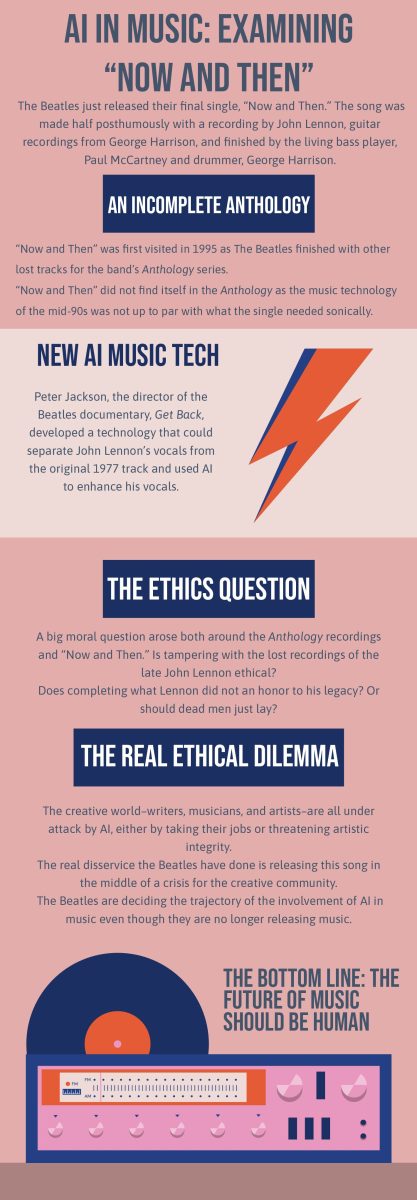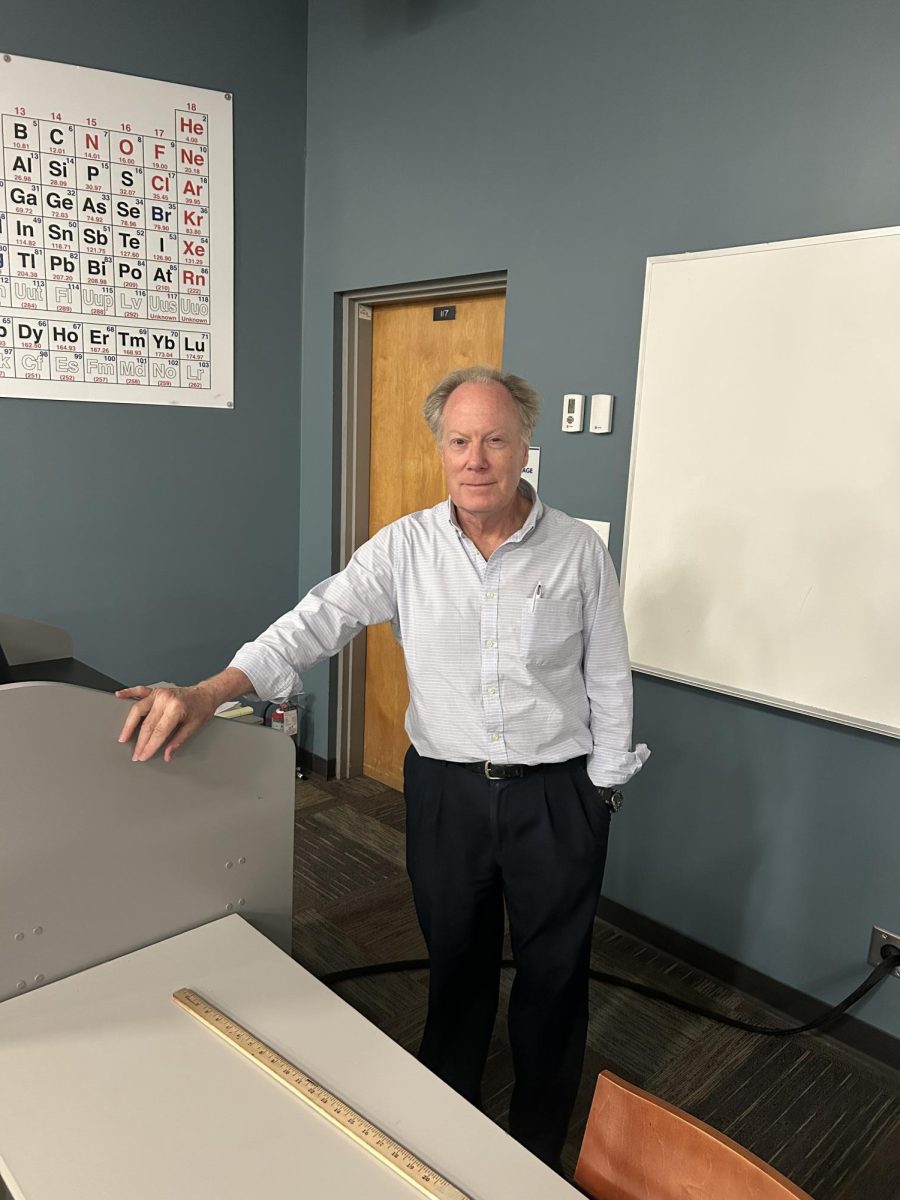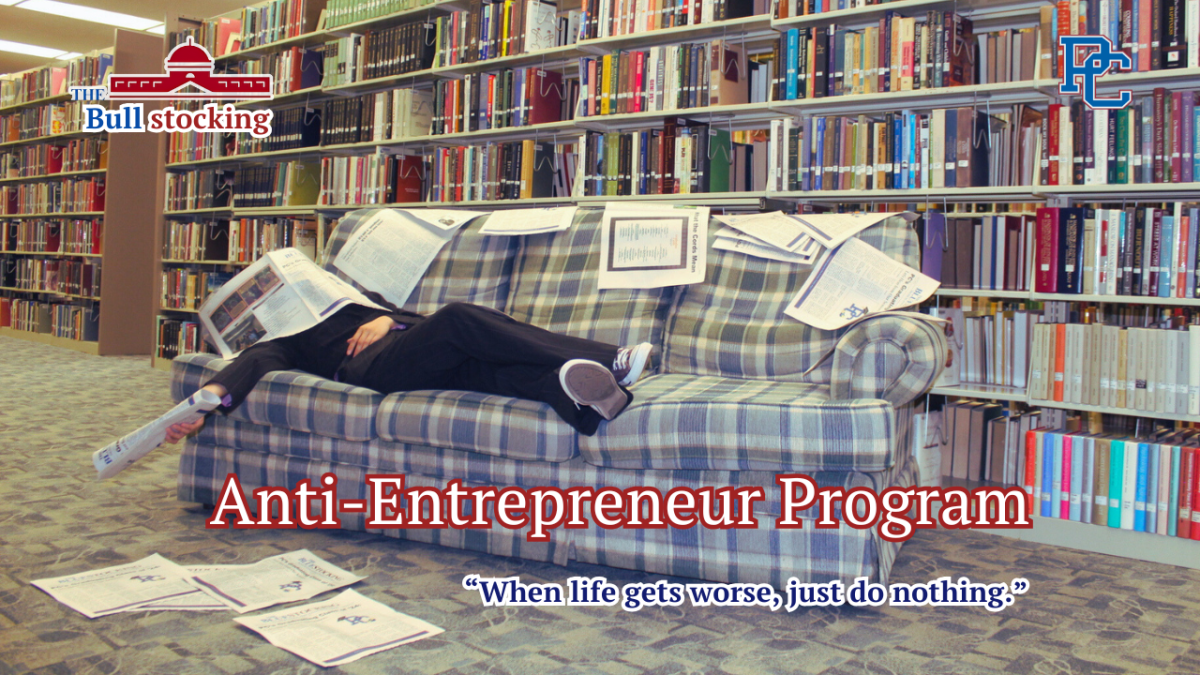The Fab Four of Rock, The Beatles, just released their final single with a half posthumous contribution aided by AI. What do these new AI capabilities mean for the future of music?
The Beatles are up to bat in the ballgame of ethics with their final single, “Now and Then.” The Fab Four’s bat of choice: artificial intelligence. The enemy of the creative sphere was the key tool in completing the Beatles.
A sentence you would not expect to hear in the year 2023, “The Beatles released a new single.” The word “new” treads very lightly. Though the single is new to the public, “Now and Then” was almost five decades in the works. The song was finally released with the help of new AI music technology from Peter Jackson, director of the Beatles Get Back documentary.
Penned by John Lennon in 1977, the track was first visited in 1995 as Paul McCartney, George Harrison and Ringo Starr toyed with other lost tracks for the band’s Anthology series. Of the completed and formally “final” Beatles songs were “Free as a Bird” and “Real Love.”
“Now and Then” did not find itself on any of these LPs as the music technology of the mid-90s was not up to par with what the single needed sonically.
“In John’s demo tape, the piano was a little hard to hear. And in those days, of course, we didn’t have the technology to do the separation,” said Paul McCartney in the micro-documentary about the single. “Every time we wanted a little bit more of John’s voice, this piano came through and clouded the picture.”
From 1995 until 2023, the track was shelved–especially after the death of George Harrison in 2001. McCartney expressed his disappointment in what he felt was the incomplete discography of the Beatles.
A big moral question arose both around the Anthology recordings and “Now and Then.” Is tampering with the lost recordings of the late John Lennon ethical?
Does completing what Lennon did not, an honor to his legacy? Or should dead men just lie?
“I get it. I get the desire to have more of what you loved after it’s gone,” said former journalist and current Professor of English at Presbyterian College, Dr. Kendra Hamilton. “It’s the same impulse that made people make holograms of Michael Jackson performing at the Billboard Awards that one time. But I’m also firmly of the opinion that just because you can do something doesn’t mean you should. Death is a part of life, and efforts to beat the corpse of an artist for just one more book or song or performance are a hard no with me.”
The ethical question is quite the hot spot for critics lately. Their consensus: don’t play God.
Opinion writer for GQ Magazine, Lucy Ford, even goes as far as to claim, “Paul McCartney may want to finish an unpolished Beatles song, but he cheapens Lennon’s humanity in the process.”
In the YouTube documentary, The Last Beatles Song (Short Film), McCartney ponders on this moral dilemma of acting on the unwritten will of a dead man:
“Is this something we shouldn’t do?” He asked. “Every time I thought like that I thought, ‘Wait a minute.’ Let’s say I had a chance to ask John, ‘Hey John, Would you like us to finish this last song of yours?’ I’m telling you, I know the answer would’ve been, ‘Yeah!’ He would’ve loved that.”
Maybe, the public’s opinion on how bandmates of decades upon decades shouldn’t hold the weight here. Critics don’t know John Lennon like Paul McCartney knew him. If McCartney knew what Lennon would desire, isn’t that morally righteous enough?
“To make a real Beatles’ record this had to be done and that it was done with the control and authority of Paul and Ringo and George Martin’s son Giles, means more and eliminates, for me, the creepy factor of non-human tampering,” said Dr. Terry Barr, music blogger, author and Professor of English at Presbyterian College.
Artificial intelligence seems lately like the buzzword for today’s doomsday fear fuel. It feels quite dystopian to say that almost a quarter through the 21st century, the Beatles have not died despite two of the members being six feet underground– all thanks to computer technology.
It’s non-human, yes; but it’s tampering with the song of a human, approved and monitored by friends, bandmates and relatives. So, maybe it is less creepy as Barr inserts since the non-human aspect is closely monitored by humans. The real unsettling aspect is that the Beatles are opening a non-resealable can of worms.
The Beatles were experimental in nature, toying with contemporary pop, rock, folk and playing with psychedelic ideas– it’s not far off for McCartney or Lennon’s son to claim that John Lennon would approve of his track coming back to life. It doesn’t seem malice for Yoko Ono to offer up Lennon’s unfinished tapes.
A proposal: maybe the critics are asking the wrong ethical question.
Maybe this ethical dilemma is more of a moral responsibility to the rest of the creative sphere– writers, musicians and artists. Creatives are at war with AI, but the Beatles, a timeless world-renowned band– “more famous than Jesus” –just gave the platform for this technology to tear the creative community down, brick by brick.
If the Beatles are doing it, why wouldn’t the rest of musicians do it? Why wouldn’t the estates of dead artists dig out old tracks to be completed?
“I think others will follow,” said Barr. “For instance, I’m sure there are David Bowie songs waiting for us, and whenever Neil Young passes, those of us who love him know that we’ll be treated to his new/old songs for the rest of our lives. This, to me, is good only if people connected to the artists have a say in what gets released. There are, sadly, so many profiteers out there who want only the money and fame.”
Critics could spend years analyzing the ethics of Lennon’s song being completed almost five decades later by AI. The ethics are foggy for sure, even if his motive seems clear.
“I think the ethics of the whole thing need to be examined,” said Hamilton. “The first thing we have to ask is why are people doing it? Are they doing it to honor the dead, out of some sense of posterity, which I think is Paul McCartney’s motivation? Or are they doing it for the dollars? We know the answer in 99% of the cases is going to be the latter. Paul McCartney has all the money in the world, world-class directors at his beck and call and he misses his friend, so he went for it.”
Paul McCartney’s intentions seem pure enough, even if critics don’t think it’s his place to act on the will of a man who is no longer alive.
The argument needs to change, debating these semantics is not going to make a change when it comes to AI.
The real disservice the Beatles have done is releasing this song in the middle of a crisis for the creative community. Writers across Hollywood, and the globe, were on strike for the greater part of 2023 due to corporations replacing human writers for TV, music, broadcasting and media with robots.
Hamilton comments on this injustice, “Maybe in some ideal world the point of AI is to enhance the human; in the real world corporations are using it to replace the human: to avoid paying fair wages and benefits and gobble up all the profits for themselves.”
The guidelines are the Wild West when it comes to AI, as the issue itself is still in its infancy. AI lacks concrete structure and corporations are taking grave advantage of this fact. So many creatives fear for not just their jobs but for the integrity of art itself.
Matt O’Brien of the Associated Press reported on AI’s effect on musicians and songwriters: “‘The music industry is also threatened,’ said Nashville-based country songwriter Marc Beeson, who’s penned tunes for Carrie Underwood and Garth Brooks. Beeson said AI has potential to do good but ‘in some ways, it’s like a gun — in the wrong hands, with no parameters in place for its use, it could do irreparable damage to one of the last true American art forms.’”
The critique of “Now and Then” should not just be that maybe it’s wrong to use technology to tamper with the taped voice of a dead man. The critique should be about the weight of influence the Beatles hold over music and the direction music is going in.
Metaphorically put, you don’t order food for the table when you’re not staying at the restaurant. The Beatles should not start a harmful thread of AI in music that threatens artistic careers and integrity, especially since “Now and Then” was their last single. The Beatles are deciding the trajectory of the involvement of AI in music even though they are no longer releasing music.
Of course, McCartney, Starr and the Lennon-Onos are on board, they want to revive something they lost. That’s innocent enough.
What isn’t innocent is while reviving what they have lost, they are playing a part in killing the future generation of music, writing and art.
This is the true ethical irresponsibility of the Beatles.
Works Cited:
- https://www.theverge.com/2023/11/2/23943290/now-and-then-the-beatles-new-song-ai
- https://www.smh.com.au/culture/music/would-john-have-wanted-a-new-beatles-song-paul-says-yeah-20231102-p5egx2.html
- https://www.gq-magazine.co.uk/article/beatles-paul-mccartney-ai-song
- https://apnews.com/article/ai-copyright-artificial-intelligence-b456fa19dd90bea87533f97f043a31bc
- https://www.latimes.com/entertainment-arts/business/story/2023-09-27/false-starts-secret-talks-insiders-tell-how-the-writers-strike-ended-with-lets-make-a-deal
- Live Quotes: Dr. Kendra Hamiliton and Dr. Terry Barr




